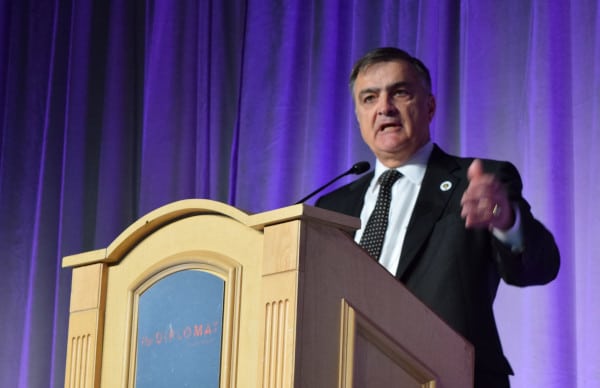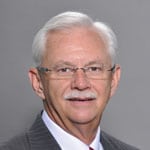The White House, Public Domain via Wikimedia Commons.
The outlook for union labor and working families in America has improved drastically in the last 21 months.
From 2016–2020, workers fought against an onslaught of anti-labor policies, executive orders, personnel appointments and more:Anti-worker government actions, 2016–2020
1. The previous administration and Congress refused to include union pension protection in COVID-19 relief bills.
2. The previous president attempted to devalue SMART/union apprenticeships through expanded management-devised Industry- Recognized Apprenticeship Programs (IRAPs).
3. The previous president’s FRA administrator refused to implement two-person crew rules and attempted to override state laws with an imposed one-person crew standard.
4. Anti-worker figures were appointed to the National Labor Relations Board (NLRB), including Peter Robb — a management-side labor lawyer — as general counsel.
5. The former NLRB made it more difficult for workers to picket a subcontractor.
6. The former NLRB held that employers can legally monitor or search employees’ personal vehicles on company premises.
7. The former NLRB issued a decision making it easier for employers to restrict employees’ rights to talk to their coworkers about their union during work time, including asking a coworker to join the union, asking a coworker to vote to strike or asking a coworker to vote to ratify a contract.

8. The former NLRB proposed a rule questioning whether building trades union agreements properly recognize the union as majority representative — even when the agreements contain language that recognizes the union as majority representative. This proposed rule would make it easier for contractors to walk away from the contract after it expires without attempting to negotiate a new agreement.
9. The previous president signed an executive order that threatened funding for Social Security.
10. The previous president’s Occupational Safety and Health Administration (OSHA) responded to the pandemic with temporary guidance that removed most employer responsibility to investigate or record workplace-related coronavirus cases in non-healthcare workplaces — including for essential sheet metal, rail and bus workers.
11. The previous president’s signature law, the Tax Cut and Jobs Acts (TCJA), encouraged offshoring of both paper profits and real production of U.S. multinational companies – hurting workers.
12. The previous president recommended vetoing the Protecting the Right to Organize (PRO) Act if it reached his desk.
13. The previous president proposed a 2020 budget that would have cut Department of Labor (DOL) funding and eliminated the Manufacturing Extension Partnership, a public-private partnership that helps small- and medium-sized manufacturers (and their workers) compete.
14. The previous administration encouraged firms to misclassify employees as independent contractors, lowering workplace standards and putting union jobs in jeopardy.
15. The previous administration rescinded a rule that required large employers or employers of workers in dangerous occupations to submit detailed logs of workplace injuries and illnesses for OSHA to publish online — making it harder to regulate and prevent further injuries.
16. By revoking an earlier rule, the previous administration made it easier for contractors who violate basic labor and employment laws to be awarded contracts paid for by taxpayer dollars.
17. The former NLRB gave employers more power to prevent organizers and off-duty employees from talking with employees at the workplace, during nonwork time, about forming a union.
18. The previous president’s DOL proposed a rule that would make it easier for employers to use the “fluctuating workweek” method, which better allows companies to avoid paying their workers overtime.
19. The previous administration rolled back child labor laws that regulated teenage use of operator-driven power lifts without supervision.
20. The previous administration proposed a paid parental-only leave plan that would force workers to cut into their Social Security benefits to fund their paid parental leave.
21. The previous administration announced a program that allowed employers who violate wage and hour laws to avoid paying penalties by volunteering to investigate themselves.
22. The previous administration weakened workplace safety protections for offshore drilling workers by eliminating a requirement for third-party inspections of safety measures and equipment, making key safeguards optional and allowing for industry self-policing.
23. The previous administration eliminated workers’ ability to choose who to form a union with, enhancing employers’ ability to manipulate bargaining units by adding in workers they feel would oppose the union.
24. The previous administration and Congress constantly attempted to sabotage the Affordable Care Act, which helps provide better healthcare for families of SMART members.
25. The previous administration delayed and weakened a mine inspection rule, allowing employers to send miners in before inspections are finished and letting operators not record hazardous conditions if they correct them “promptly.”
26. The previous president said he “loved right-to-work,” and his Justice Department successfully argued to make it the standard policy for government employees.
In the 2020 election, working people made their voice heard at the ballot box — and since then, the outlook for SMART members has changed for the better, as your union has constantly pushed the current administration to act on behalf of workers.
Pro-worker government actions, January 2021–Present
1. The current Congress and president passed the American Rescue Plan into law, which jumpstarted the U.S. economy, provided billions of dollars in union pension relief, invested billions into reopening schools and indoor air quality, and allocated $100 million to OSHA for worker safety.
2. The current Congress and president passed the Inflation Reduction Act into law, which will help cut healthcare prices for working families, fight climate change and hold the one percent accountable to pay their fair share in taxes. The IRA invests heavily in green energy infrastructure, with strong labor standards ensuring that SMART sheet metal workers will be in demand for this work.
3. The current Congress and president passed the CHIPS and Science Act, which invests in the U.S. semiconductor industry and American-made manufacturing. SMART sheet metal workers are uniquely qualified for the good, union jobs (constructing and maintaining semiconductor facilities) this legislation will create.
4. The current president and Congress passed the Bipartisan Infrastructure Law, which will rebuild our country’s crumbling infrastructure. Along with huge investments in traditional infrastructure like our nation’s railroad and public transportation systems, the law focuses on the industries in which SMART members work — like indoor air quality, energy efficiency and more — providing an enormous number of new jobs in the future.
5. The current House of Representatives passed the National Apprenticeship Act of 2021, which invests in registered apprenticeships while cutting federal funding for anti-union IRAPs. If this bill passes the Senate, the current president will sign it into law.
6. The current president appointed Marty Walsh, a lifetime union member and former president of the Boston Building Trades, to lead the U.S. Department of Labor.
7. The current president appointed Amit Bose as FRA administrator. Bose has consistently welcomed SMART TD to the table and listened to our concerns and perspective on matters that would impact SMART members.
8. Bose’s FRA proposed long overdue federal two-person crew regulations, which would provide much-needed safety and job assurances to our members.
9. Within hours of taking office, the current president fired Peter Robb, the most anti-union general counsel in the NLRB’s history, and appointed a pro-worker NLRB, including Jennifer Abruzzo — formerly the Special Counsel for Strategic Initiatives at the Communications Workers of America — as general counsel.
10. NLRB General Counsel Abruzzo issued a memo urging the NLRB to outlaw anti-union captive audience meetings.
11. NLRB General Counsel Abruzzo has proposed requiring employers to recognize a union once a majority of workers sign pro-union cards, rather than forcing workers to seek recognition via NLRB election or other, more complicated methods.
12. NLRB General Counsel Abruzzo has declared that college athletes have the right to organize, as do immigrant workers in the United States.
13. In its first major decision, the NLRB found that employers violate federal labor law by barring workers from wearing pro-union buttons or other apparel, enshrining workers’ rights to wear pro-worker gear on the job.
14. The current president appointed Doug Parker — former staff attorney for the United Mine Workers of America and executive director of Worksafe, an organization that advocates for workers in the Bay Area — as director of OSHA, returning the agency to its pro-worker role.
15. The current president appointed Jessica Looman, formerly the executive director of the Minnesota Building and Construction Trades Council, to lead the DOL Wage and Hour Division.
16. The current president issued an executive order repealing the former administration’s IRAP initiative, putting to bed one of the most serious threats the union building trades have faced.
17. The current president approved the environmental impact statement for the Hudson Tunnel Project and restored nearly $1 billion for California High Speed Rail, all of which was blocked by the previous administration. These projects would provide more jobs for SMART members.
18. The FRA released a new fatigue rule that “requires certain railroads to develop and implement a Fatigue Risk Management Program as one component of the railroads’ larger railroad safety risk reduction programs.”
19. The current administration’s OSHA announced a National Emphasis Program (NEP) related to heat and workplace safety. The NEP will prioritize inspections on hot days, target high-risk industries (including construction) and develop a federal rule to protect workers from heat-related illnesses.
20. For the first time in 40 years, the DOL announced a proposed rule updating and strengthening Davis- Bacon and Related Acts (DBRA) prevailing wage regulations.
21. The current White House launched the Clean Air in Buildings Challenge to encourage buildings to improve ventilation. The recommendations specifically noted that skilled, trained and certified workers (SMART members) should perform this work.
22. The current president signed an executive order strengthening Buy American provisions, requiring federal bodies to buy more American-made products and invest in domestic manufacturing.
23. The current president signed an executive order to raise the minimum wage for federal contractors to $15/hour.
24. The current president signed an executive order that gives workers the federally protected ability to refuse dangerous work.
25. The current president signed an executive order establishing the White House Task Force on Worker Organizing and Empowerment, which released 70 recommendations to promote worker organizing and collective bargaining.
26. The current president signed an executive order requiring project labor agreements on large federal projects (costing $35 million or more).
27. The current administration announced over $386 million in consolidated Rail Infrastructure and Safety Improvements (CRISI) grant program funds to 46 projects in 32 states and the District of Columbia — an investment in rail workers’ safety.
28. In August 2022, the White House launched an initiative to promote better air in buildings, linking to the SMART website for guidance from the experts in this field — a tacit endorsement of SMART workers as the experts qualified to perform indoor air quality work.
29. The current president has openly sided with workers seeking to unionize at Amazon, sought the input of SMART and other unions in relation to construction, transportation and other impactful policy areas, and signed executive orders repealing anti-union rules of the previous administration.
30. The current president initiated student loan debt relief for working families, removing a key barrier for workers and their children as they seek to enter the middle class.
31. Current president and Congress passed and signed the PACT Act, to support veterans from the Iraq and Afghanistan wars, the first Gulf War, the Vietnam War and a host of smaller deployments across the globe in between those campaigns who suffered from exposure to chemicals and other toxins.








 As the SMART Transportation Division’s state and district legislative boards begin planning for their quadrennial reorganization meetings in 2016, members and local officers are reminded that elections for the positions of legislative representative and alternate legislative representative should now be complete. Any local in which elections have been delayed due to run-offs or other extenuating circumstances must contact the Transportation Division’s main office in Cleveland, Ohio to advise of the cause for delay and expected date of completion. All election results must be reported to the Transportation Division’s office as soon as they are available. Election results may be sent by email to
As the SMART Transportation Division’s state and district legislative boards begin planning for their quadrennial reorganization meetings in 2016, members and local officers are reminded that elections for the positions of legislative representative and alternate legislative representative should now be complete. Any local in which elections have been delayed due to run-offs or other extenuating circumstances must contact the Transportation Division’s main office in Cleveland, Ohio to advise of the cause for delay and expected date of completion. All election results must be reported to the Transportation Division’s office as soon as they are available. Election results may be sent by email to  By UTU International President Mike Futhey –
By UTU International President Mike Futhey –